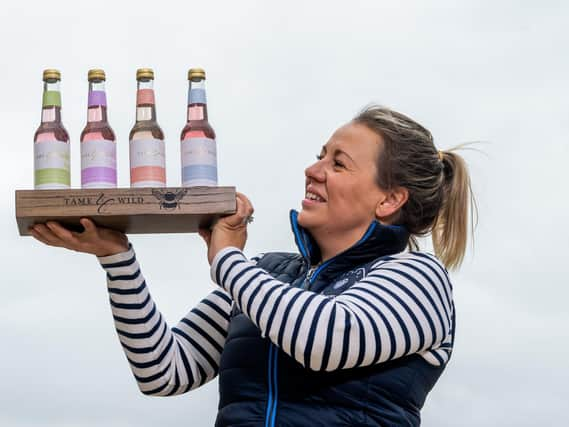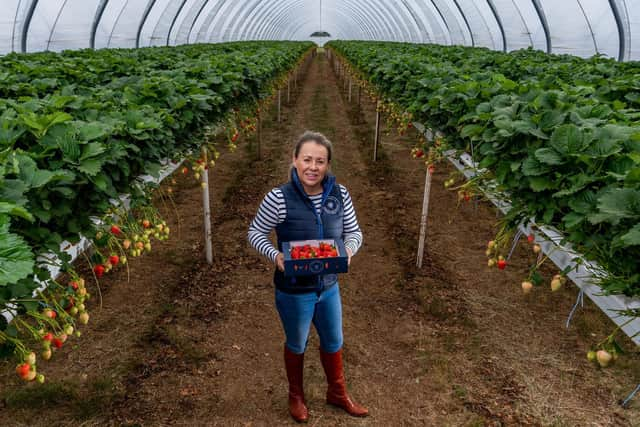Yorkshire strawberry farmer Annabel Makin-Jones is championing sustainability and zero waste at the family farm near Garforth


In the past 14 months Annabel has launched her own Annabel’s Deliciously British range of strawberries, her own branded non-alcoholic drinks, Tame & Wild, and her own jam which will be launched at the end of this month. Next in line is honey, to be produced as her latest new venture alongside the strawberry fields.
Annabel said her guiding principles are quality produce, sustainability, eliminating food waste, looking after her massive team and diversification. Lockdown, rather than stymying her, has accelerated Annabel’s thoughts, visions and activities.
Advertisement
Hide AdAdvertisement
Hide Ad“We started growing strawberries in 2004 and have always supplied the major supermarket chains, such as Morrisons.


“Whatever we do here is all down to doing it well, the best we can, producing premium berries, all of which are grown in multi-bay, telescopic polytunnels using a hydroponic system that we started with in 2011. The crop is grown on steel tables making conditions far better for our pickers as they are at just the right height. It is a back-breaking job if strawberries are grown on the ground.
“When lockdown came I had some sleepless nights re-thinking our markets for the berries, plus how we could manage our season safely for our team. It starts in May and runs to November. That’s when I made a number of long-term decisions for us to be more sustainable and to eliminate food waste by entering into a new product. I had always been concerned about the number of imperfect or wonky berries that hadn’t made the grade and were wasted.
“I’d had the idea of a jam brand for a long time. Around 99 per cent of big supermarket brands of jam are made from imported fruit. My view was that there must be a way we could produce a premium quality British strawberry jam that would sell in the likes of Fortnum & Mason and other premium major retailers.”
Advertisement
Hide AdAdvertisement
Hide AdAnnabel understands that success in any competitive market place is down to hard work, energy, commitment and passion. Winning a bronze medal with the British Dressage team at the European Championships in 1998 showed what she was capable of in sport and in business she is just as passionate.
“I’ve always believed in straight talking and when I started Annabel’s Deliciously British I went to London and sold myself to the major retailers like Harrod’s and many of the best hotels, restaurants and chefs offering them what I feel are the best quality strawberries grown in the UK.
“We now have a vast amount of chefs who won’t use anything but Annabel’s Deliciously British. I’m working with our drinks and jam in the same way. Quality comes first, no matter what we do.”
Tame & Wild is the non-alcoholic drinks brand that Annabel launched in November last year. There are currently four flavours that all include strawberries from Sturton Grange, along with other English fruits and foraged botanicals. It’s another example of how Annabel is using up what she terms her wonky strawberries.
Advertisement
Hide AdAdvertisement
Hide Ad“The non-alcoholic drinks and now our jam will hopefully eliminate food waste completely over time as we grow those strands. And then there’s the honey.
“We wouldn’t have a business without bees. They are crucial to our crop and they are the most amazing insects. We are now moving into beekeeping, which will add to our sustainability and provide us with another product to be called Yorkshire Honey.
“I’m just waiting for my queens to arrive, otherwise we are now all set up with 20 hives across a 20-acre field.
“I am so excited about our future with everything we have going on. If we don’t set our sights high, it’s our own downfall. Our products are already well respected and now we’re adding to our range. We’re also highly sustainable. We have our own lake from which water is supplied for our strawberry crop, we generate electricity from solar panels and are improving wildlife habitat.”
Advertisement
Hide AdAdvertisement
Hide AdAt the height of the season Annabel employs a team of 300 predominantly from Eastern Europe. Picking, packing and distribution is all handled on site. While she couldn’t do without the bees, she also couldn’t do without her team.
“The lockdown situation could have been cataclysmic for her if her team had not been able to get over this year.
“Fortunately, nearly everyone has come. Around 85 per cent are returnees each year and work exceptionally hard. We look after all our team who live on site and have a shop and gym facilities available. We’ve been ensuring they work in small groups during lockdown.”
Annabel grew up working for her father, Chris Makin, on the family farm that today sees the farming operation extended to 1,100 acres over three farms.
Comment Guidelines
National World encourages reader discussion on our stories. User feedback, insights and back-and-forth exchanges add a rich layer of context to reporting. Please review our Community Guidelines before commenting.